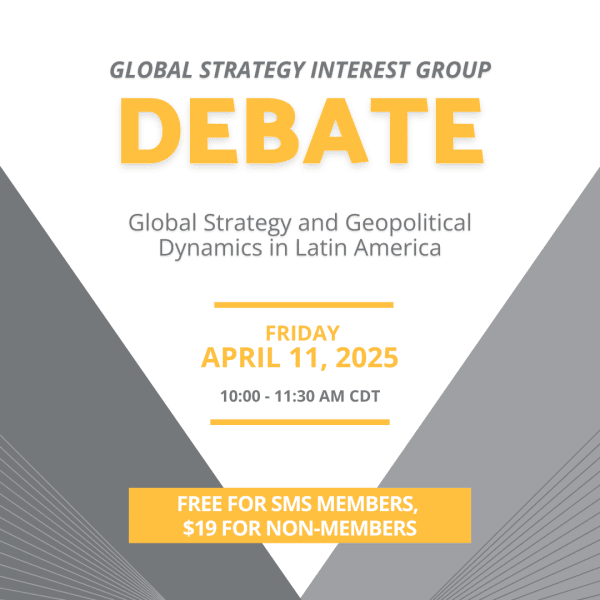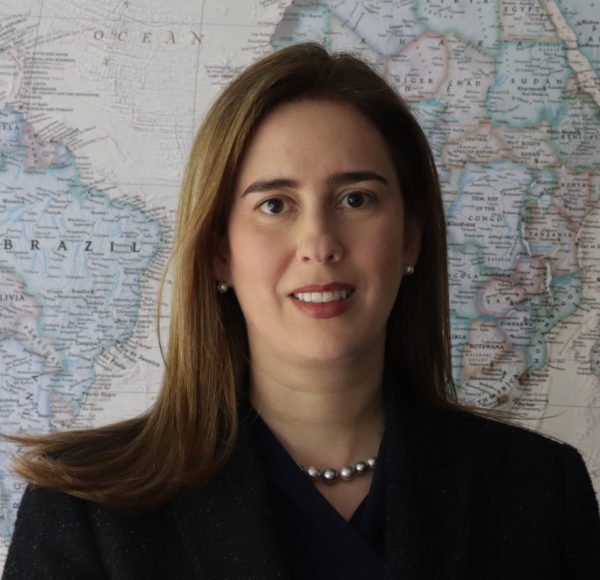

Join us for a moderated discussion on how the newly forming geopolitics will impact companies in Latin America, and the rest of the world. We will follow a modified Ox-Bridge style debate.
Initial Charge: In Latin America, to align with a global power will be a threat to global south trade routes, welfare, prosperity, and peace.
For the charge: (Yes, aligning with a side would threaten South trade)
Against the charge: (No, alignment is necessary)
A non-exhaustive list of questions that we predict will guide the debate are below:
1. How does the US-China trade war expand into Latin America?
2. Does it make sense for Panama to decide not to renew their contract with China, under pressures from the US?
3. Should small Latin American countries align with the US or China?
4. Should mid- large-size Latin American countries align with the US or China?
5. Should Latin American countries join BRICS?
6. Could Brazil emerge as a game changer pole in Latin America?
7. What kind of mechanisms and institutions are effective in Latin America that work as checks and balances, and regulate how the region reacts to the US-China trade conflict?
8. How relevant and critical are small countries in Central America to the rivalry between the US and China?
9. How critical and effective are the financial institutions in managing financial and economic crises, and in return influencing the Latin American countries?
10. Would aligning with either the US or China enable or dampen regional integrity of the Global South?
11. What kind of power and influence do international organizations have (if any) to change the regional dynamics in Latin America?
12. Are the global institutions effective in sustainable growth and development of countries in Latin America?
Price: FREE for SMS Members, $19 for non-members
Speakers: Santiago Mingo, William Newburry, Gerald McDermott, and Luciano Ciravegna
Moderator: Maria Andrea De Villa

William Newburry Ryder Eminent Scholar of Global Business at Florida International University
William (Bill) Newburry is the Ryder Eminent Scholar of Global Business at Florida International University. Dr. Newburry is also a Fellow of the Academy of International Business (AIB) and a Non-Resident Senior Research Fellow at the Nanyang Business School Center for Emerging Markets. His research focuses on how multinational corporations manage and relate to subsidiaries and other local stakeholders when they invest in foreign countries, with a particular emphasis on reputation issues.
Dr. Newburry is currently serving a five-year term (2019-2024) on the Academy of Management International Management Division Executive Committee. He is also the President of the Consortium for Undergraduate International Business Education (CUIBE, 2020-2024) and served as the Local Host Chair for the 2022 AIB Meeting in Miami. He served as Chapter Chair of the Academy of International Business Latin America (AIB-LAC) Chapter (2012-2018), and previously chaired (2008-2009) the Global Strategy Interest Group of the Strategic Management Society after serving in multiple other Interest Group positions.
Bill was awarded a Silver Medal for his cumulative publications in the Journal of International Business Studies (JIBS) in 2019. He serves as Associate Editor of AIB Insights and Series Editor for Research in Global Strategic Management. He serves on the Senior Advisory Board of the Review of International Business and Strategy, and on the editorial review boards of the JIBS, Journal of World Business, Journal of Management Studies, Global Strategy Journal, Journal of International Management, Thunderbird International Business Review, and Cross Cultural and Strategic Management. Bill has published 45+ articles in top-tier journals, along with three books and another 20 chapters in edited books.

Gerald McDermott Department Chair and Professor of International Business at University of South Carolina
Gerald A. McDermott is the department chair and a professor of international business at the Darla Moore School of Business at the University of South Carolina. Prior to joining the Moore School, he was an assistant professor of multinational management at the Wharton School, University of Pennsylvania for seven years and held a secondary appointment in the Department of Political Science.
He specializes in international business and political economy. McDermott received his Ph.D. from the Department of Political Science at MIT. His first stream of research focused on the impact of industrial networks on the creation of economic governance institutions in post-communist countries. His current research in South America uses both comparative and statistical survey methods to examine the socio-political conditions under which societies build new innovative capacities to achieve sustained upgrading in their industries. Besides relevant scholarly articles, this work has thus far produced a highly unique multi-region, multi-sector (wine and autos) database with state-of-the-art measurements of firm-level upgrading capabilities, inter-firm networks and institutional networks. He has also recently launched a project about the impact of international integration regimes on local institutional development via a comparison of the EU accession, NAFTA and Mercosur.
His publications include articles in such scholarly journals as Comparative Political Studies, Industrial and Corporate Change, Review of International Political Economy, Academy of Management Review, Journal of International Business Studies, Organization Studies and Politics & Society as well as his book, Embedded Politics: Industrial Networks and Institutional Change in Post-Communism (University of Michigan Press, 2002), which was a finalist for APSA’s 2003 Woodrow Wilson Foundation Award for the Best Book on government, politics and international affairs. McDermott has also consulted for the multilateral lending institutions and the governments of the Czech Republic and Argentina. He lived in Prague for over four years and in Buenos Aires for over six years, being fluent in both Czech and Spanish.

Luciano Ciravegna Full Professor at INCAE Business School
Dr. Luciano Ciravegna holds a PhD from the London School of Economics, an MPhil (a two-year research-based master’s degree) from the University of Oxford, St Antony’s College, and a BSc (with Honours) from the London School of Economics. He is a Full Professor at INCAE and holds the Steve Aronson Chair in Strategy and Sustainability, an endowed chair awarded through a competitive process among faculty every four years.
Dr. Ciravegna leads the research area at INCAE Business School. He has authored four books published by Financial Times Press, Routledge, and Palgrave. His scientific research has been cited 4,812 citations according to Google Scholar as of January 2025, and has been featured, amongst others, in the Journal of International Business Studies, Entrepreneurship Theory and Practice, Strategic Management Journal, Journal of World Business, Organization Studies, Global Strategy Journal, and Journal of Business Ethics.
Dr. Ciravegna’s research focuses on strategy, marketing, and governance in family businesses. He has studied the world’s oldest companies to identify best practices that support longevity. His findings emphasize the importance of mechanisms that promote family continuity and cohesion, combined with governance tools that enable the separation of assets, business, and family interests.
Dr. Ciravegna has been an Associate Professor at King’s College London and Royal Holloway, University of London, and has served as a Visiting Professor, amongst others, at Hong Kong University, ESCP, and Universidad de los Andes.

Santiago Mingo Associate Professor at Pontificia Universidad Católica de Chile
Santiago Mingo is an Associate Professor at Pontificia Universidad Católica de Chile, where he teaches entrepreneurship, innovation, and strategy. Before joining Pontificia Universidad Católica de Chile, he was an Associate Professor at Universidad Adolfo Ibáñez, where he served as Academic Director of the CEMS Master in International Management and Chair of the PhD in Management Program.
Santiago received his Doctor of Business Administration from Harvard Business School. His research examines how institutions and business environments shape entrepreneurship, corporate strategy, and international business, with a particular emphasis on emerging markets, venture capital/private equity, and cross-border investments. His work has been published in top academic journals, including Management Science, Administrative Science Quarterly, Journal of International Business Studies, Journal of Management, Industrial and Corporate Change, Journal of World Business, International Business Review, and Journal of Business Research.
He is an Associate Editor at the Journal of Business Research and serves on the editorial review boards of Global Strategy Journal and Long Range Planning. He has received multiple competitive research grants, including funding from Chile’s National Agency of R&D (ANID). Santiago has been actively involved in the Academy of International Business Latin America & the Caribbean Chapter (AIB-LAC), where he served as a Country Representative for Chile, contributing to research, academic collaborations, and professional development initiatives in the region. He also regularly presents his work at major academic conferences, including the Academy of Management Annual Meeting, Strategic Management Society, and the Academy of International Business.
Beyond academia, Santiago has consulted for private firms, investment funds, and government agencies on corporate strategy, internationalization, and foreign investment in Latin America.
 Maria Andrea De Villa Professor of Strategy at Universidad EAFIT and Visiting Professor at University of Michigan-Flint
Maria Andrea De Villa Professor of Strategy at Universidad EAFIT and Visiting Professor at University of Michigan-Flint
Maria Andrea De Villa is Professor of Strategy at Universidad EAFIT and Visiting Professor at University of Michigan-Flint. She received her Ph.D. from Cranfield University (UK). She studies the internationalization of firms, particularly from emerging markets, and how firms manage socio-political risks and relations through nonmarket strategies (corporate political strategies and corporate social responsibility) and strategize to address grand challenges such as climate change. Her work has been published in Global Strategy Journal, International Business Review, Journal of International Management, among others. She serves as Communications Editor of Long Range Planning and Editorial Review Board Member of Global Strategy Journal, Long Range Planning, Strategic Organization, and Multinational Business Review.